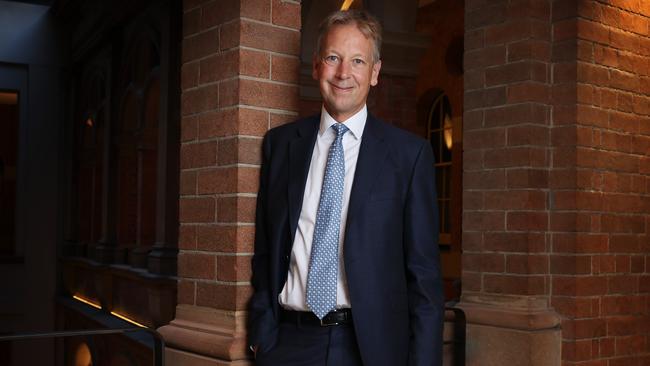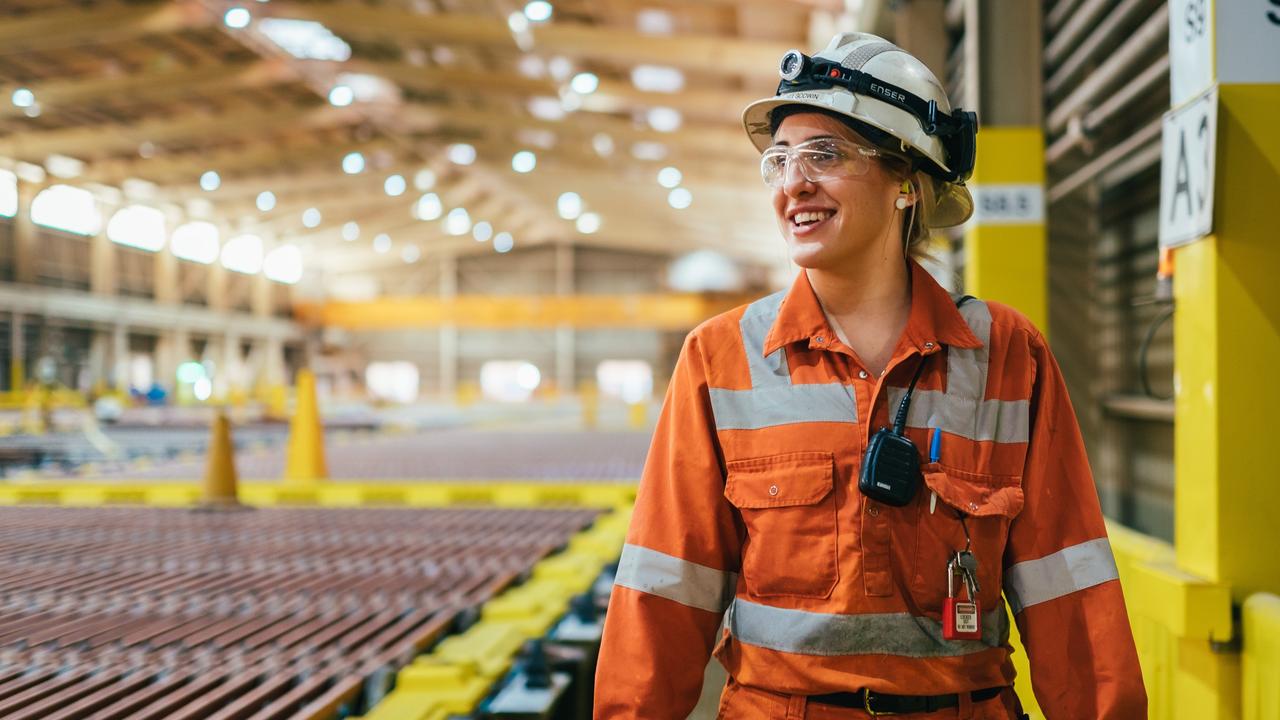Rio Tinto CEO Jakob Stausholm says this is a pivotal moment for resources sector
Mining boss Jakob Stausholm says Australia needs to grasp the opportunities and ensure it does not price itself out of the market.

Business
Don't miss out on the headlines from Business. Followed categories will be added to My News.
Economy
How would you rate the momentum of the Australian economy as we head into 2025? Official forecasts have Australia trimming interest rates from the first half of calendar 2025, is that consistent with your view? What are you seeing around inflation in your own business?
We remain positive about Australia as a place to do business and we are investing a lot and
have future investment plans across the country.
That being said, there are risks, including potential global economic slowdowns and the ongoing effects of tighter monetary policies. Australia has a very strong mining sector, a relatively stable labour market, and sectors like renewable energy and technology are emerging as key growth drivers.
The quality of Rio Tinto’s assets and the nature of the mining industry buffers us from inflation to some extent, as it puts upward pressure on commodities prices.
Across the board we’re seeing more stability in costs. We are making lots of improvements to our cost base. In some areas there is some inflation, and our efforts are balancing that.
Outlook
What excites you heading into 2025? Are you likely to increase, hold steady, or trim your investment spend?
I’m super optimistic about Rio Tinto’s future and I believe the best opportunities are ahead of us.
I am also optimistic about what we are achieving today to capture those opportunities.
In recent years we have successfully worked to stabilise our operations, and this month we
released 2025 production guidance that shows we are unlocking their potential and have started what we expect to be a decade of 3 per cent compound annual production growth, as we continue to develop and ramp up iron ore, copper and lithium growth projects.
And we are changing the culture of our company. While there’s still much to do, it is leading to a workplace where everyone can feel safe, respected and empowered. This will drive our
performance and enable us to deliver for our shareholders – and all stakeholders – in 2025 and beyond.
We are increasing our intended global investment spend from around $US9.5bn this year to around $US11bn in 2025, and we have given medium term guidance of US$10bn to
$US11bn. That includes growth and decarbonisation spending, as well as replacement and
sustaining capital.
Reform
As we move into an election year, in your mind, what’s the single biggest lever that can/should be used to lift Australia’s competitiveness or productivity? This could be across any area from labour market, tax reform, training or other areas to encourage investment.
Australia needs to maintain and improve its competitiveness at a pivotal time for the world and the resources industry due to the global energy transition.
Commodities demand is growing and shifting to energy transition materials. Australia needs to
grasp opportunities and ensure it does not price itself out of the market.
Areas where urgent action is needed are energy-intensive industry and the current labour
market reforms.
In energy, Australia needs to decide whether it wants to regain the internationally competitive
position it once held for energy intensive industries.
Coal and gas are no longer cheap in Australia, like they were 20 years ago. The aluminium
sector here, where Rio Tinto is the largest Australian manufacturer, has been shrinking and
there has been no growth investment since 2004. To strengthen the sector and get it back to
being internationally competitive, and even growing, we need to repower.
Extra support required includes transmission lines to deliver the renewables being underwritten
by industry, and investment and production credits to help bridge the gap until there is
convergence in global carbon pricing or premium in the aluminium price.
In the labour market, productivity must be central to any reforms, and we are not seeing that in current industrial relations changes.
We are concerned the current reforms will become a handbrake on the economy over the long
term and put Australia on a path to lower living standards and lower wage growth.
Overall, we remain positive about Australia as a place to do business and we have future
investment plans across the country. But global conditions are increasingly competitive and
economic reforms must drive productivity.
Geopolitics
Will a Donald Trump presidency have a potential impact on your business or sector (tariffs or streamlined regulation)? Does geopolitics drive a bigger part of your decision-making?
As a global business, we often need to navigate changes in government. During the first Trump administration, there were some changes that were ultimately very favourable for us. One of the focuses of our business is supporting national developments, and we are working with a number of governments to understand what they want to achieve. While it’s too early to speculate – since the new government has not taken office – there is the possibility that these changes could be positive for our business.
It’s clear there is an increasing recognition of the need for domestic supply sources of copper
and other critical materials in the US, to support manufacturing and a clean energy future.
We can play a significant role in helping to deliver these materials and will continue to engage in the dialogue around this.
People
Has your organisation’s approach to flexible working – including working from home – evolved during the year. Is this likely to change further into 2025?
We operate a 24/7 business across multiple time zones. That means, some flexibility in how and when we engage with our workforce is important. A significant portion of our company’s work requires on-site presence, especially when working and managing operations across various locations.
For roles where remote work is feasible, our people discuss with their leaders the most effective mix of office and home working. We recognise there is growing recognition of the benefits that face-to-face interaction and collaboration bring to creating strong team dynamics.
Technology
Where is your organisation along the AI journey – is it in the developmental stage, or are you now using the technology at scale across your business? If so, are benefits matching the promise?
At Rio Tinto, our 150 years of mining and processing expertise serves as a strong platform for
innovation. Today, technologies like automation and AI are reshaping how we operate—making our processes safer, more efficient, and more sustainable. AI is not only improving operations but also reinforcing our commitment to ESG priorities.
We want to enhance our AI capabilities and extend the benefits across our sites. Progress is
being made, with the level of AI integration varying across our operations. Our Pilbara
operations are the most advanced, in terms of supply chain integration of AI and automation
technologies.
That said, while we are a global leader in automation, we are still in the infancy of learning to
truly use all the data we generate from automation, including application of AI, so there is great opportunity there.
Originally published as Rio Tinto CEO Jakob Stausholm says this is a pivotal moment for resources sector


